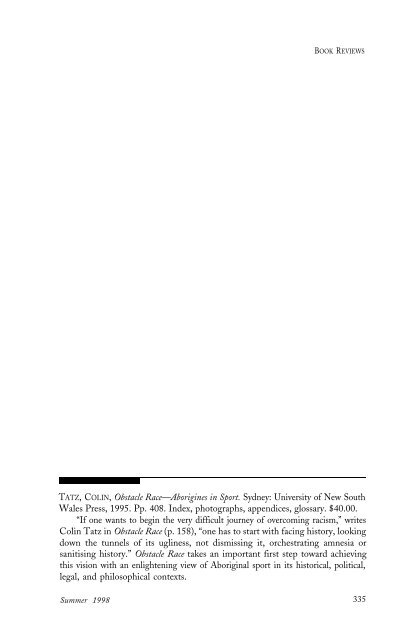Tatz, Colin. Obstacle Race - Aborigines in Sport ... - LA84 Foundation
Tatz, Colin. Obstacle Race - Aborigines in Sport ... - LA84 Foundation Tatz, Colin. Obstacle Race - Aborigines in Sport ... - LA84 Foundation
BOOK REVIEWS TATZ, COLIN, Obstacle Race—Aborigines in Sport. Sydney: University of New South Wales Press, 1995. Pp. 408. Index, photographs, appendices, glossary. $40.00. “If one wants to begin the very difficult journey of overcoming racism,” writes Colin Tatz in Obstacle Race (p. 158), “one has to start with facing history, looking down the tunnels of its ugliness, not dismissing it, orchestrating amnesia or sanitising history.” Obstacle Race takes an important first step toward achieving this vision with an enlightening view of Aboriginal sport in its historical, political, legal, and philosophical contexts. Summer 1998 335
- Page 2 and 3: JOURNAL OF SPORT HISTORY Why did Ta
BOOK REVIEWS<br />
TATZ, COLIN, <strong>Obstacle</strong> <strong>Race</strong>—<strong>Aborig<strong>in</strong>es</strong> <strong>in</strong> <strong>Sport</strong>. Sydney: University of New South<br />
Wales Press, 1995. Pp. 408. Index, photographs, appendices, glossary. $40.00.<br />
“If one wants to beg<strong>in</strong> the very difficult journey of overcom<strong>in</strong>g racism,” writes<br />
<strong>Col<strong>in</strong></strong> <strong>Tatz</strong> <strong>in</strong> <strong>Obstacle</strong> <strong>Race</strong> (p. 158), “one has to start with fac<strong>in</strong>g history, look<strong>in</strong>g<br />
down the tunnels of its ugl<strong>in</strong>ess, not dismiss<strong>in</strong>g it, orchestrat<strong>in</strong>g amnesia or<br />
sanitis<strong>in</strong>g history.” <strong>Obstacle</strong> <strong>Race</strong> takes an important first step toward achiev<strong>in</strong>g<br />
this vision with an enlighten<strong>in</strong>g view of Aborig<strong>in</strong>al sport <strong>in</strong> its historical, political,<br />
legal, and philosophical contexts.<br />
Summer 1998<br />
335
JOURNAL OF SPORT HISTORY<br />
Why did <strong>Tatz</strong> choose to look at sport <strong>in</strong> order to understand the situation of<br />
<strong>Aborig<strong>in</strong>es</strong> <strong>in</strong> Australia? Because <strong>Aborig<strong>in</strong>es</strong> are over-represented <strong>in</strong> sport. In<br />
the Northern Territory, where only 22 percent of the population are Aborig<strong>in</strong>al,<br />
they form 70 percent of the players <strong>in</strong> the A and B divisions of Australia’s national<br />
sport, Australian Rules Football. One could seek, as have many, to f<strong>in</strong>d a genetic<br />
explanation for a racially l<strong>in</strong>ked performance advantage. As <strong>Tatz</strong> po<strong>in</strong>ts out, that<br />
serves no purpose, except perhaps to denigrate the very performances that are<br />
under scrut<strong>in</strong>y. Such a biological determ<strong>in</strong>ist model neglects the motives that<br />
push Aborig<strong>in</strong>e youths to discover self-determ<strong>in</strong>ation, autonomy, ritual, power,<br />
self-expression, and survival <strong>in</strong> a racist and oppressive world. What is important<br />
to see, and what <strong>Tatz</strong> highlights, is how sport reflects and exemplifies the<br />
Aborig<strong>in</strong>al condition <strong>in</strong> Australia, yet concurrently conta<strong>in</strong>s the potential to elevate<br />
and consolidate this people <strong>in</strong> the face of persistent and <strong>in</strong>stitutionalized racism.<br />
The history of Aborig<strong>in</strong>al sports is one of exceptional talent, focus and<br />
determ<strong>in</strong>ation, punctuated by an underside of rejection, belittl<strong>in</strong>g abuse and racial<br />
vilification. While sport was, and rema<strong>in</strong>s, an avenue for social and economic<br />
advancement for Aborig<strong>in</strong>al people, many have been neglected and <strong>in</strong>deed rejected<br />
by the country to which their performances brought glory. Jack Marsh, seen as<br />
one of the best bowlers <strong>in</strong> cricket <strong>in</strong> the early twentieth century, was kicked to<br />
death-his assailants were set free—only ten years after his heyday. And, eighty<br />
years down the road, as we approach the twenty-first century, Aborig<strong>in</strong>e Nicky<br />
W<strong>in</strong>mar, a stellar Australian Rules player, was subjected to the vociferous and<br />
vituperative jeers of 50,000 Coll<strong>in</strong>gwood fans who vilified his sk<strong>in</strong> color and<br />
racial background.<br />
<strong>Sport</strong> serves, however, an important function <strong>in</strong> Aborig<strong>in</strong>al communities.<br />
<strong>Tatz</strong> describes the need for cement-a susta<strong>in</strong><strong>in</strong>g faith or philosophy—to enhance<br />
cohesion, to br<strong>in</strong>g <strong>Aborig<strong>in</strong>es</strong> together. And sport, he believes, has the potential<br />
to create this bond. The modern history of the Aborig<strong>in</strong>al people has been one of<br />
loss of sovereignty, which has left a listless people without a raison d’etre. <strong>Sport</strong>,<br />
on the other hand, provides clear goals, social regulations, control mechanisms,<br />
elaborate rituals, support groups, and the promise of rewards—the very th<strong>in</strong>gs<br />
that have been damaged by the coloniz<strong>in</strong>g forces. The Yuendumu games, organized<br />
by the Warlpiri people, are an example of how Aborig<strong>in</strong>al pride can be renewed<br />
through sport, organized and run by <strong>Aborig<strong>in</strong>es</strong> for <strong>Aborig<strong>in</strong>es</strong>. Culture, ritual<br />
and sport are celebrated accord<strong>in</strong>g to Aborig<strong>in</strong>al values and identity, and this<br />
practice has been successfully transplanted to other communities.<br />
Although <strong>Obstacle</strong> <strong>Race</strong> takes on the noble role of tell<strong>in</strong>g us about the plight<br />
of the <strong>Aborig<strong>in</strong>es</strong> <strong>in</strong> Australia through the story of sport, it is not through this<br />
education that rampant racism will f<strong>in</strong>d its resolution. “Education programs<br />
cannot, and will not, eradicate a racism and xenophobia that is endemic <strong>in</strong> the<br />
total culture of a society,” writes <strong>Tatz</strong> (p. 353). Never have educational programs<br />
fostered a susta<strong>in</strong>ed change <strong>in</strong> racist behavior, and <strong>Tatz</strong> proposes that we should<br />
take steps to crim<strong>in</strong>alize racial vilification <strong>in</strong>stead of sanction<strong>in</strong>g those behaviors<br />
that are unacceptable <strong>in</strong> contemporary society. He challenges sports associations<br />
to act <strong>in</strong>dependently and not to wait for State legislation aga<strong>in</strong>st racism.<br />
336<br />
Volume 25, Number 2
BOOK REVIEWS<br />
<strong>Sport</strong> is not only the cement of the Aborig<strong>in</strong>al people, it is the means by<br />
which their identity, their mere existence, is brought forward <strong>in</strong> the consciousness<br />
of white Australia. As such, this tome, which also regales the sport aficionado<br />
and the statistician, br<strong>in</strong>gs about a clear perception of a people—their strife,<br />
their contributions, and their strengths.<br />
—ANNEMARIE JUTEL<br />
University of 0tago<br />
Summer 1998 337



